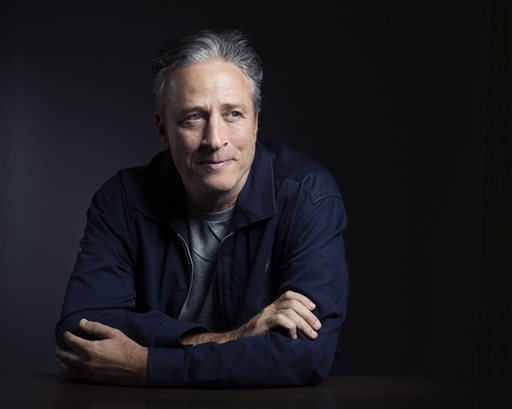Jon Stewart signing off ‘Daily Show’ fake newscast for real

FILE – In this Nov. 7, 2014 file photo, Jon Stewart poses for a portrait in promotion of his film,”Rosewater,” in New York. Stewart will end his show “The Daily Show with Jon Stewart.” on Aug. 6. (Photo by Victoria Will/Invision/AP, File)
NEW YORK — After more than 16 years and nearly 2,600 telecasts, Jon Stewart can feel proud of his scads of Emmys and his pair of Peabody Awards, his cultural gravitas (he hung with the Prez, both on and off the air!), even his reprobate status at Fox News.
Who could blame him for wanting to depart “The Daily Show” on this high note?
Besides, maybe it had gotten too easy. By June, when Donald Trump jumped into the presidential race, a giddy Stewart framed this jest-alluring candidacy as Trump’s going-away gift to him, “putting me in some sort of comedy hospice where all I’m getting is straight morphine.”
Or maybe it had gotten too hard.
When he took over “The Daily Show” in January 1999, Stewart’s simple mission was to host a program that would lampoon “real” newscasts and newsmakers they enabled.
“I like keeping up with the news,” he told The Associated Press at the time, “even though I think it’s gotten so out of control. But that’s what I like about ‘The Daily Show’: It’s like checks and balances.”
But in an interview a few months ago, Stewart put a bit more dismally the task of finding the funny in the news.
“I think of us as turd miners,” he said. “I put on my helmet, I go and mine turds. Hopefully I don’t get turd lung disease.”
A famous definition of news: “What those in power don’t want you to know.”
Meanwhile, the illuminative mockery of Stewart’s “fake news” might be defined as “What those in power don’t want you to think.”
Always questioning authority — whether politicians, corporate titans, media barons or, of course, puffed-up journalists — Stewart did what satirists have done for centuries: He seized on the absurdity embedded in accepted truth.
But as “The Daily Show” aped the bombast and blizzard of graphics employed, without irony, by “legitimate” newscasts, Stewart never copped to grandiose claims for what he was up to.
“Our meeting every morning is an explicit discussion of what’s going on in the world,” he declared in a 2004 interview with The Associated Press. “But then the rest of the day is spent trying to hide that under layers of fart jokes.”
While Stewart is undeniably left-leaning, his show, he said, “doesn’t honor the distinction between left wing and right wing, or liberal and conservative, or in some respects between Democrat and Republican.
“We only honor the distinction between real and absurdly fake,” he said, then grinned. “And WE are absurdly fake.”
“The Daily Show” under Stewart thus made a credible argument that, for both journalism and public affairs, bogus is the new real, leaving fact and fantasy interchangeable. “The Daily Show” prevailed as a bit of daylight in between, a privileged space that granted Stewart almost limitless freedom to make fun of things, even as he exercised due diligence in making sense of them in the process.
Some (even Stewart) would say “The Daily Show” is a half-hour of silliness meant to call out politicians and other power brokers with no higher purpose than amusing its audience.
Still, he was sharply attuned to America’s many wrong turns, how its leadership and media routinely let the country down. In 2010, he and fellow Comedy Central fake-news host Stephen Colbert even organized a rollicking “Rally to Restore Sanity and/or Fear” that drew tens of thousands to Washington’s National Mall.
Americans, said Stewart in one of the telecast’s more serious moments, do “impossible things every day that are only made possible through the little, reasonable compromises we all make.”
But reasonable compromises are what elected officials are loath to make in the present day; what news media dismiss in favor of spotlighting the more watchable bad behavior and conflict.
Americans do work together to get things done, insisted Stewart.
“The only place we don’t is here,” he said, pointing behind him at the Capitol, “or on cable TV.”
There has been little sign of sanity restored.
“Wouldn’t it be nice if people who jumped to conclusions and peddled a false, divisive, anger-stoking narrative had to apologize for misleading America?” mused Stewart last March in reference to a certain cable-news network.
On Aug. 6, Stewart, now 52, will step aside, making way for Trevor Noah, a 31-year-old stand-up comic from South Africa, to manage this nightly reality check as the nation dives headlong into the 2016 presidential election cycle.
Maybe Stewart has concluded things are crazier than ever. And, after all, how much crazy can one man comb through night after night, searching for laughs, and retain his own sanity?
In June, as he reflected on the mass shootings in a black church in Charleston, South Carolina, there were no laughs to be had.
“I honestly have nothing, other than sadness,” he said before sadly predicting that, even now, after yet another American atrocity, “we still won’t do jack—” to join together for a solution.
Are things crazier than ever?
Or maybe do we recognize the crazy more? Are we more painfully aware?
If that’s the case, his fans can thank Stewart for his abiding and soon-to-be-missed role in bringing us the crazy with insight, clarity and, of course, loads of laughs. Whatever he’s been mining for his more than 16 years, he made the most of it.